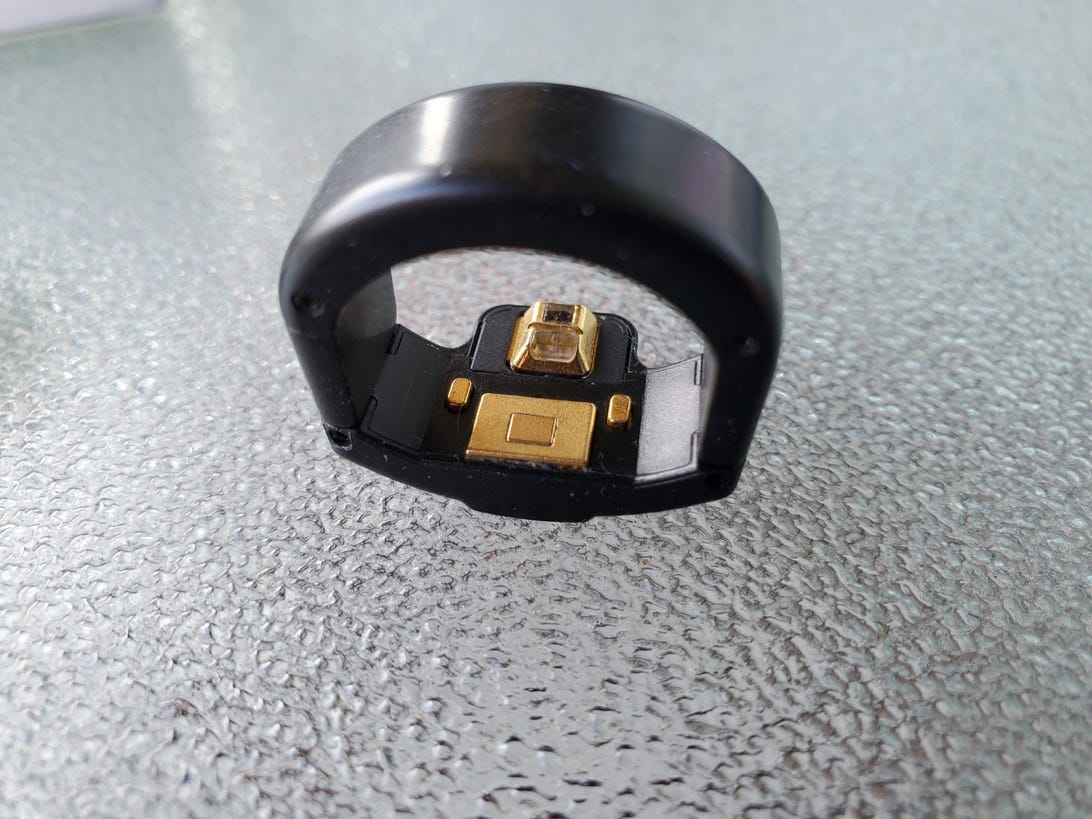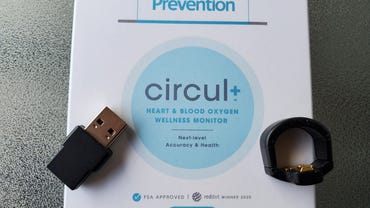Last year, I tested out the Oura Ring 3 and wore it for about three months as I tested out whether or not it was useful for my health and wellness. For the past few months, I have also placed another ring on my finger, mostly at night, to test out its functionality and features. The Prevention Circul Plus ring from BodiMetrics captures more health data, but it also isn’t a ring you will find yourself wearing and forgetting about.
Also: Oura Ring 3 review: Unobtrusive 24/7 health tracking with more to come in 2022
One reason the Oura Ring is successful is that you can replace a wedding ring with it or add one more piece of jewelry. Within a few weeks, it becomes just another ring on your fingers that you forget about and let capture your data 24/7 with a week between charging. The Prevention Circul Plus is more of an intentional wearable because when it is mounted on your finger, you likely will not be able to bend your finger all of the way down, and you may also feel the tightness of the ring around your finger while the battery life supports focused measuring periods.
Like
- Flexible sizing for solid fit
- Extensive data capture capability
- Blood pressure checks from your finger
- Accurate sleep tracking
- Detailed reports
Don’t Like
- Can’t fully bend your finger
- Short battery life
- No Apple Health integration
The Prevention Circul Plus wellness ring is available from places like Amazon for $299. There is no subscription to use the ring, and it captures an extensive amount of wellness data, including:
- Blood oxygen levels
- Continuous heart rate
- Overnight skin temperature
- Sleep stages
- ECG
- Blood pressure.
The battery life is only sufficient for capturing your sleep and a few hours of other activity, but that may be fine for your specific needs.
Hardware
Before placing your order for a Prevention Circul Plus ring, you need to figure out which finger(s) you will place it on to measure your health data. But, with the way the ring is designed, you can likely wear it on multiple fingers. There are three sizes available because the ring is designed with spring-loaded sides that extend about 5mm on each side of the ring. A small size covers ring sizes from 5 to 9, a large from 9.5 to 12, and an extra-large from 9.5 to 13.5. I tested a size large and primarily used my left index finger for measurements.
The ring comes in one color, matte black. The width of the large ring measures about 8-9mm, so it’s a fairly substantial ring. The top portion is a semi-circle that transitions into two straight sides. The sides extend up, and when you release the top of the ring, they close up with a spring-loaded design. There is a charging indicator light under the top curved portion of the ring.
The lower portion of the ring is fairly flat and contains all of the sensors. The inside (top) of the lower portion has various gold-colored contact points with one sensor portion that moves up a down a bit to form a tight fit with your finger when placed into position. The sensor that moves in and out is located on an extension that protrudes in this area about 6mm forward. On the bottom of this lower portion, we find another gold contact point used to capture health data described below.
A short USB charging platform is provided. Insert the ring onto the USB charging platform, and magnets hold it in place as it aligns with the two narrow gold connectors on the top of the lower portion of the ring. The charging platform can be a bit finicky, so make sure the green charging indicator light comes on after a few seconds when you think you have it positioned properly. I connected the ring a couple of times and then later, when I wanted to wear it to sleep, discovered that it was dead and did not charge up as intended. I’ve gotten much better at this over time, and now when I position it, the ring fully charges for tracking.
The BodiMetrics website states that the ring can track all of your sleep details, with continuous measurement, for up to 12 hours per night, and that matches my experiences. It was reliable for a full night of sleep and then blood pressure checks in the morning. I used the ring for sleep and daytime tracking but did not use it for exercise tracking as I didn’t find it comfortable enough for exercise.
The Prevention Circul Plus ring supports measuring blood oxygen, sleep, heart rate, skin temperature, steps, calories burned, oxygen desaturation index, electrocardiogram, heart rate variability, and blood pressure. Similar to how the Samsung Galaxy Watch (outside the US) blood pressure measurements are performed, you start with calibration of the Circul Plus with a blood pressure cuff and then use the ring to measure blood pressure. Calibration is recommended with a blood pressure cuff once a month. The remaining measurements are performed directly by the ring.
Specifications
- Materials: 316L stainless steel with PVD coating
- Wireless: Bluetooth 4.2
- Dust/water resistance: IP65
- Sensors: 6-axis accelerometer, 3-wavelength photo-electric sensor
- Battery life: Up to 16 hours with continuous monitoring
- Weight: 10.1g (large size)
- Blood oxygen accuracy: Plus/minus 3%
- Heart rate accuracy: Plus/minus 2 beats per minute

Smartphone software
There are Android and iOS apps for the Prevention Circul Plus ring, called Circul Plus. The user interface, details of the data captured by the ring, and reports are excellent, but, unfortunately, the data captured by the Circul Plus cannot be a data source for Apple Health.
After you have set up your account and made the initial connection between your phone and the ring, the app launches with Home, Reports, Me, and Help tabs. The Home page has summary data for your sleep, exercise, activity (steps and calories), current pulse rate and blood oxygen levels, ring battery status, and buttons for daytime, exercise, sleep, and ECG/BP. Tap on the sleep section to open up a full sleep report that shows blood oxygen and pulse rate charts for continuous readings with averages and ranges throughout the evening. Swipe up to view more of the page where detailed sleep stages for awake, REM, light, and deep sleep is shown. There is no overall sleep score like we see in other wearables. Reports can be exported or shared with your doctor, coach, or family.
Once you put on the ring, you then tap daytime, exercise, sleep, or ECG/BP to initiate a measurement session for that activity. As soon as you tap the button, the monitoring screen appears, and a timer starts. A large Stop button appears below the timer, and to stop the monitoring of that activity, you must press and hold on to the stop button. The current reading is shown on most of the display. Once you stop the timer, a report is generated, and you are taken to the Reports tab.
The daytime option requires a minimum period of two minutes and records for up to 12 hours. This option records blood oxygen and heart rate continuously. The exercise mode option continuously records your heart rate with a minimum time of 10 minutes and a full length of up to 12 hours. The sleep mode requires a minimum of 30 minutes and records your oxygen saturation, heart rate, and finger temperature for up to 12 hours. In order to receive sleep stage data, a minimum sleep time of four hours is required.
In order to measure your electrocardiogram and blood pressure, taken at the same time, you hold up the hand with the ring and then use your other hand to place a finger on the bottom gold connector. With the ring on my left index finger, I sit up straight and place my right index finger on the connector as my ECG and blood pressure is measured over a period of about 20-30 seconds.
The reports screen shows a couple of line summaries of all of your measurements. Tap on any one of these summaries to view the full report that you can then share with others. The reports look very professional and provide detailed, accurate data.
The Me tab is where you manage your connected devices, set the units of measurement, manage the ring firmware, and edit your profile. You can also setup a cloud account to sync your data off of your phone. The Help tab provides a detailed help file that includes an introduction video and how-to sections for specific measurements.
Daily usage experiences and conclusions
The Prevention Circul Plus is not a wear it and forget it type of wearable, but if you prefer the ring form factor for accurately tracking your sleep or checking your blood pressure, then it might be a wearable to consider. It is very easy to charge, wear, and initiate a measurement session with detailed reports.
I wore the Circul Plus ring with an Oura ring, WHOOP band, Garmin watch, and Withings ScanWatch to check the reliability and accuracy of the measurements. The Circul Plus ring matched these other wearables and was even more useful for me with blood pressure measurements that did not require a full cuff. The Circul Plus measures data continuously, so all of the minimum and maximum values are captured. REM and light sleep, often periods that some watches don’t capture well, seemed to match the WHOOP and Oura ring well.
It took me a while to get used to wearing the ring for sleep tracking since I did not like that I could not bend my finger all of the way down, and it felt a bit restrictive. After a few weeks of using it, the bulkiness wasn’t that noticeable, and I was found wearing it to bed. As great as the reports look and as accurate as the data seems, the data doesn’t have as much value to me personally without the ability to sync to Apple Health. The data is interesting, but there is no feedback provided on ways to improve the results or guidance on when to get to sleep to achieve optimal levels or anything like we see with Oura or WHOOP.
The Prevention Circul Plus is an affordable device that serves as an option for those who don’t want to use a watch or blood pressure cuff daily for monitoring their health stats. It’s a bit of a clunky ring, but it does fit comfortably, and the flexible sizing means you can switch up which finger you use to track your health data.





















